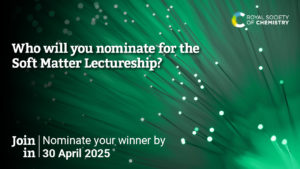Do you know an early-career researcher who deserves recognition for their contribution to the soft matter field?
Soft Matter is pleased to announce that nominations are now being accepted for its 2025 Lectureship award and will close on 30th April 2025. This annual award was established in 2009 to honour an early-stage career scientist who has made a significant contribution to the soft matter field.
Eligibility
To be eligible for the lectureship, candidates should meet the following criteria:
- Be an independent researcher, PhD students postdoctoral research associates are not eligible
- Be actively pursuing research within the soft matter field, and have made a significant contribution to the field
- Be at an early stage of their independent career (this should typically be within 12 years of attaining their doctorate or equivalent degree, but appropriate consideration will be given to those who have taken a career break, work in systems where their time period to independence may vary or who followed an alternative study path)
How to nominate
Nominations must be made via email to softmatter-rsc@rsc.org, and include the following:
- The name, affiliation and contact details of the nominee, nominator and referee
- An up-to-date CV of the nominee (1-3 A4 page maximum length)
- A letter of recommendation from the nominator (500 words maximum length). The relationship between nominator and nominee should be stated in the letter.
- A supporting letter of recommendation from a referee (500 words maximum length). This could be from the nominee’s academic mentor, PhD supervisor or postdoc for instance. The relationship between referee and nominee should be stated in the letter.
- The nominator must confirm that to the best of their knowledge, their nominee’s professional standing is as such that there is no confirmed or potential impediment to them receiving the Lectureship
Please note:
- Self-nomination is not permitted
- The nominee must be aware that he/she has been nominated for this lectureship
- Previous winners and current Soft Matter Editorial Board members are not eligible
- As part of the Royal Society of Chemistry, we have a responsibility to promote inclusivity and accessibility in order to improve diversity. Where possible, we encourage each nominator to consider nominating candidates of all genders, races, and backgrounds. Please see the RSC’s approach to Inclusion and Diversity.
Selection
- All eligible nominated candidates will be assessed by a judging panel made up of the Soft Matter Editorial Board, any Editorial Board members with a conflict of interest will be ineligible for the judging panel.
- The judging panel will consider the following core criteria:
- Excellence in research, as evidenced in reference to originality and impact
- Quality of publications, patents or software
- Innovation
- Professional standing
- Independence
- Collaborations and teamwork
- Evidence of promising potential
- Other indicators of esteem indicated by the nominator
- In any instance where multiple nominees are judged to be equally meritorious in relation to these core criteria, the judging panel will use information provided on the nominee’s broader contribution to the chemistry community as an additional criterion. Examples of this could include: involvement with RSC community activities, teaching or demonstrating, effective mentorship, service on boards, committees or panels, leadership in the scientific community, peer reviewing, promotion of diversity and inclusion, advocacy for chemistry, public engagement and outreach.
Previous winners
2024 – Sujit Datta, Caltech, USA
2023 – Qian Chen, University of Illinois at Urbana-Champaign, USA
Andela Saric, Institute of Science and Technology, Austria
2022 – Xuanhe Zhao, Massachusetts Institute of Technology, USA
2021 – Silvia Marchesan, University of Trieste, Italy
2020 – Valeria Garbin, Delft University of Technology, Netherlands
2019 – Timothy J White, University of Colorado, USA
2018 – Susan Perkin, University of Oxford, UK
2017 – Daeyeon Lee, University of Pennsylvania, USA
2016 – Damien Baigl, Ecole Normale Supérieure, Paris, France
2015 – Lucio Isa, ETH Zürich, Switzerland
2014 – Eric Dufresne, Yale University, USA
2013 – Eric Furst, University of Delaware, USA
2012 – Patrick Doyle, MIT, USA
2011 – Michael J. Solomon, University of Michigan, USA
2010 – Bartosz Grzybowski, UNIST, Republic of Korea
2009 – Emanuela Zaccarelli, University of Rome, Italy
Nominations deadline: 30 April 2025











